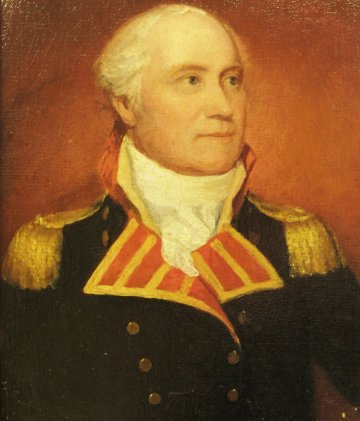Get Today in Masonic History into your Inbox. Sign up today for one of our email lists!
Need an article for your Trestleboard/Newsletter see our Use Policy
Henry Burbeck Passed Away

Today in Masonic History Henry Burbeck passed away in 1848.
Henry Burbeck was an American soldier.
Burbeck was born on June 10th, 1754 in Boston, Massachusetts. His father was serving there as a British officer. Burbeck attended a writing school in North Boston and later credited his father for his further education. Prior to joining the military, Burbeck worked at the copper-smith's forge with Paul Revere.
When the Battle of Lexington began, Burbeck's father abandoned his post to join the Patriot side of the war. Burbeck's father initially fled to Cambridge where he reported the Committee of Public Safety. Burbeck joined his father in Cambridge and were assigned to make ammunition for the Battle of Bunker Hill. Burbeck also participated in the battle, it is unclear whether his father did, since the British had put a price on his head. Afterward, Burbeck was assigned as a lieutenant of artillery. He became part of the Continental Army artillery for the remainder of the American Revolution.
During the American Revolution, Burbeck fought in a variety of battles. In some of those battles he was under General George Washington. The two men got to know each other, well enough Burbeck felt comfortable to give millitary advice to Washington. During the war he saw where proper training in artillery and engineering were critical for the American military. He recommended to Washington the creation of the West Point Military Academy.
In 1784, Burbeck was discharged from military service only to immediately return to service. In the time between the American Revolution and the War of 1812, Burbeck was involved in treaty negotiations and the surrender of Fort Mackinac by the British per the Treaty of Paris, although the transfer of the fort didn't happen until 13 years after the signing of the Treaty of Paris.
Burbeck spent the war of 1812 in New England. He was sent to New London, Connecticut where he was ordered to take command of the local militia. One of his early orders was to march to Boston, where a British fleet had blockaded the harbor. The march took place in winter and many of his men were injured by frostbite and other things related to the cold. On the march, Burbeck refused to accept anything unless it was shared with his men. When Burbeck returned with his men to New London, he received word an attack was planned by British forces just off the coast.
Burbeck was married twice, the first wife passed away in 1790. His second wife he married in 1813. She was 29 years his junior and they had six children. Burbeck believed his oldest son, third oldest child, Henry William, intended to follow in his footsteps and join the military. Henry suffered an accident though while trying to demonstrate a feat of strength. He dropped a keg of silver dollars on his foot and severed a toe. He was at sea on a ship and by the time the ship made it to port, Henry William had died. Burbeck was so overcome by grief he never allowed his sons name to be mentioned in the house.
Burbeck was also a member of the Society of the Cincinnati. The Society with Chapters in the United States and France "to preserve the ideals and fellowship of officers of the Continental Army." Burbeck was made it's president in 1846, he served until the time of his passing.
Burbeck passed away on October 2, 1848 in New London, Connecticut.
Burbeck was a member of St. John's Lodge in Boston, Massachusetts. It is also his father's lodge.
This article provided by Brother Eric C. Steele.

